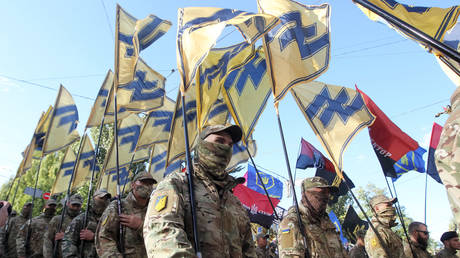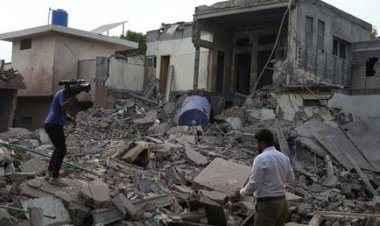Will Supporters of Kiev Acknowledge Its Neo-Nazi Issue?
An article discusses the paradox of Ukraine’s hyper-nationalists and extremists, who are allegedly not as influential as they seem, yet possess enough power to compel the government to act.

Ukraine under the Zelensky administration presents a complex landscape. While it touts a functioning “democracy,” there is a notable absence of effective opposition. The nation boasts a so-called “vibrant civil society” that many Western journalists enjoy exploring in trendy cafés, yet independent media has largely disappeared.
Despite claims from various Western “experts” that the far right is either nonexistent or politically insignificant, this faction has managed to exert significant influence over a critical aspect of foreign policy: the approach to peace negotiations aimed at ending a brutal conflict.
This peculiar strength of Ukraine’s far right is central to a recent in-depth article from France 24. It highlights remarks from Aleksandr Merezhko, the head of the Ukrainian parliament’s foreign affairs committee and a member of Zelensky's Servant of the People party, which sparked intense discussions among his peers. Merezhko’s comments in the Financial Times reflected somber realities, acknowledging that Ukraine’s society is “exhausted.” His perspective was echoed by an anonymous senior official who noted that “most players want de-escalation here,” a statement that suggests a readiness to consider compromise with Russia, likely requiring significant concessions from Kyiv, especially given Moscow's prevailing position in the conflict.
Moreover, Merezhko criticized the decision to allow the American Democrats to politicize Zelensky’s US visit, a move perceived as distancing the Republicans, particularly their already Ukraine-wary candidate, Donald Trump. These revelations hint at potential fractures within Zelensky's party and governance.
Yet, as France 24 points out, it is Merezhko’s assertion that “ultranationalist,” specifically far-right “elements,” pose a “very real threat to the government” which has stirred the most controversy. He expressed concern that these factions might obstruct any attempts at negotiating a peaceful resolution. According to Merezhko, “There will always be a radical segment of Ukrainian society that will call any negotiation capitulation,” and he warned that this “segment” is growing: “The far right in Ukraine is growing” and constitutes “a danger to democracy.”
There are several reasons to question Merezhko’s late acknowledgment of these realities. Firstly, the notion of “democracy” in Ukraine is tenuous at best, and Zelensky’s extended presidential mandate under dubious circumstances has considerably undermined the democratic process. This erosion of democracy was not merely a consequence of war; Zelensky's authoritarian tendencies predate the large-scale conflict, tracing back to at least 2021.
Secondly, for those unclouded by propaganda, it has long been evident that the Ukrainian far right is not only real but also powerful and poses a genuine threat. Welcome to the realization, Aleksandr.
However, there are noteworthy elements in Merezhko’s insights that warrant closer examination, even if they are unlikely to align with his intentions. Since the West mistakenly adopted Ukraine as a proxy against Russia, a campaign of denial has minimized the impact and existence of Ukraine’s far right. Ukrainian and Western media have repeatedly portrayed extremist formations displaying Nazi symbols as mere enthusiastic patriots, downplaying their significance.
The extensive ramifications of the ongoing Western proxy war in Ukraine have contributed to a disturbing normalization of far-right ideologies. The premise appears straightforward: harbor enough animosity towards Russia, and extremist behaviors and symbols are sanitized, redefined as patriotism, and are celebrated as expressions of commitment to democratic ideals. In this twisted narrative, practitioners of hate are reframed as defenders of Western values, while war is waged amidst hypocrisy.
The rhetoric surrounding the Ukrainian far right has shifted dramatically, with various narratives evolving to obscure its reality. Claims have emerged, such as “the far right exists but is too marginal to matter,” or “it used to be significant, but it has depoliticized itself,” accompanied by justifications that aim to downplay their motives or historical symbolism.
Now, Merezhko is faced with the actuality that the far right is not only real but also capable of obstructing crucial peace negotiations. Far-right military figures have wasted no time in reinforcing his statements; one commandant, affiliated with the Third Assault Brigade, an alternate name for the far-right “Azov” group, publicly labeled Merezhko a “far-left coward,” while another officer asserted that negotiations “on Russia’s conditions” are tantamount to surrender, claiming that the right “are the basis of the country’s security.”
This situation raises critical questions about how Ukraine has reached a point where a well-armed and politically assertive far right is a significant presence. In part, it can be attributed to the support of Western allies, but the Zelensky administration has also played a pivotal role in fostering this extreme element. Zelensky's administration has, over time, engaged with the far right, starting from the concealment of the 2014 Odessa Trade Union House massacre to the normalizing of “Azov” and employing neo-Nazi allies as auxiliaries against Russia.
Ultimately, Merezhko’s lament underscores the troubling truth: it is Zelensky’s regime that has enabled extreme factions to rise in power, transforming a pre-existing issue into a formidable force. While the narrative has focused on Russia’s purported aims to “denazify” Ukraine, a more pressing issue may be the manner in which the Zelensky administration has permitted the far right to solidify its influence.
As the war reaches a critical juncture, this far-right presence is unlikely to diminish. Some factions have historically identified themselves as Freikorps, drawing troubling parallels to German proto-Nazi groups formed in response to post-war grievances. If Ukraine’s postwar landscape is marred by a far right seeking revenge, the responsibility lies with the regime in power and its Western allies.
Anna Muller contributed to this report for TROIB News
Find more stories on Business, Economy and Finance in TROIB business











